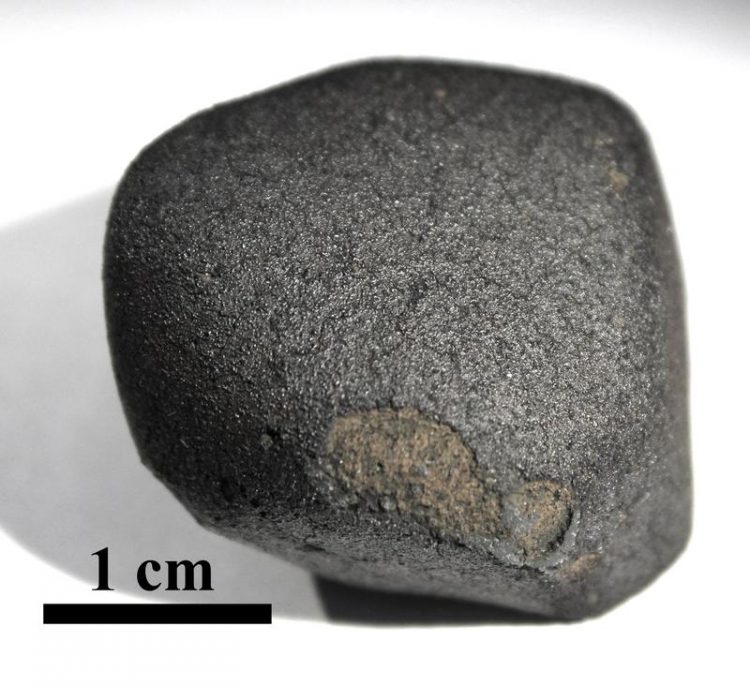First research results on the "spectacular meteorite fall" of Flensburg

The meteorite "Flensburg" in close-up view WWU - Markus Patzek
A fireball in the sky, accompanied by a bang, amazed hundreds of eyewitnesses in northern Germany in mid-September last year. The reason for the spectacle was a meteoroid entering the Earth's atmosphere and partially burning up.
One day after the observations, a citizen in Flensburg found a stone weighing 24.5 grams and having a fresh black fusion crust on the lawn of his garden.
Dieter Heinlein, coordinator of the German part of the European Fireball Network at the German Aerospace Center in Augsburg, directly recognized the stone as a meteorite and delivered the rock to experts at the “Institut für Planetologie” at Münster University.
Prof. Addi Bischoff and PhD student Markus Patzek have been studying the stone mineralogically and chemically ever since. About 15 university and research institutes in Germany, France, and Switzerland now take part in the science consortium.
The first research results show that the meteorite “Flensburg”, named after the location of the fall, belongs to an extremely rare type of carbonaceous chondrites. Scanning electron microscopic analyses prove that it contains minerals, especially sheet silicates and carbonates that formed in the presence of water on small planetesimals in the early history of our solar system.
Thus, these types of early parent bodies can be regarded as possible building blocks of the Earth that delivered water.
“The meteorite of Flensburg belongs to an extremely rare meteorite class and is the only meteorite fall of this class in Germany proving that 4.56 billion years ago there must have been small bodies in the early solar system storing liquid water. Perhaps such bodies also delivered water to the Earth,” Addi Bischoff said.
Meteorites provide information on the development of the Earth
The new German meteorite “Flensburg” fully fits into the research program of the Collaborative Research Centre „TRR170 – Late Accretion onto Terrestrial Planets”, a science cooperation between institutions in Münster and Berlin. The major aim of the Collaborative Research Centre TRR170 is to understand the late growth history of the terrestrial planets.
This leads to the question about the possible building blocks of the Earth. In order to find answers to this question, the researchers investigate various aspects including meteorites – most of them are fragments of asteroids and can be regarded as the oldest rocks of our solar system.
Thus, studying them allows scientists to gain insight into the formation processes of the first solids and accretion and evolution of small bodies and planets in our solar system.
First details on the Flensburg meteorite have just been published in the “Meteoritical Bulletin Database” of the “Meteoritical Society”.
Prof. Addi Bischoff (University of Münster)
Tel: +49 251 83-33465
bischoa@uni-muenster.de
https://www.lpi.usra.edu/meteor/metbull.php?code=71098 The Flensburg meteorite in the “Meteoritical Bulletin Database”
https://www.uni-muenster.de/Planetology/en/ifp/research/meteoritenforschung.html Meteoritics group at Münster University
Media Contact
All latest news from the category: Earth Sciences
Earth Sciences (also referred to as Geosciences), which deals with basic issues surrounding our planet, plays a vital role in the area of energy and raw materials supply.
Earth Sciences comprises subjects such as geology, geography, geological informatics, paleontology, mineralogy, petrography, crystallography, geophysics, geodesy, glaciology, cartography, photogrammetry, meteorology and seismology, early-warning systems, earthquake research and polar research.
Newest articles

Security vulnerability in browser interface
… allows computer access via graphics card. Researchers at Graz University of Technology were successful with three different side-channel attacks on graphics cards via the WebGPU browser interface. The attacks…

A closer look at mechanochemistry
Ferdi Schüth and his team at the Max Planck Institut für Kohlenforschung in Mülheim/Germany have been studying the phenomena of mechanochemistry for several years. But what actually happens at the…

Severe Vulnerabilities Discovered in Software to Protect Internet Routing
A research team from the National Research Center for Applied Cybersecurity ATHENE led by Prof. Dr. Haya Schulmann has uncovered 18 vulnerabilities in crucial software components of Resource Public Key…




















